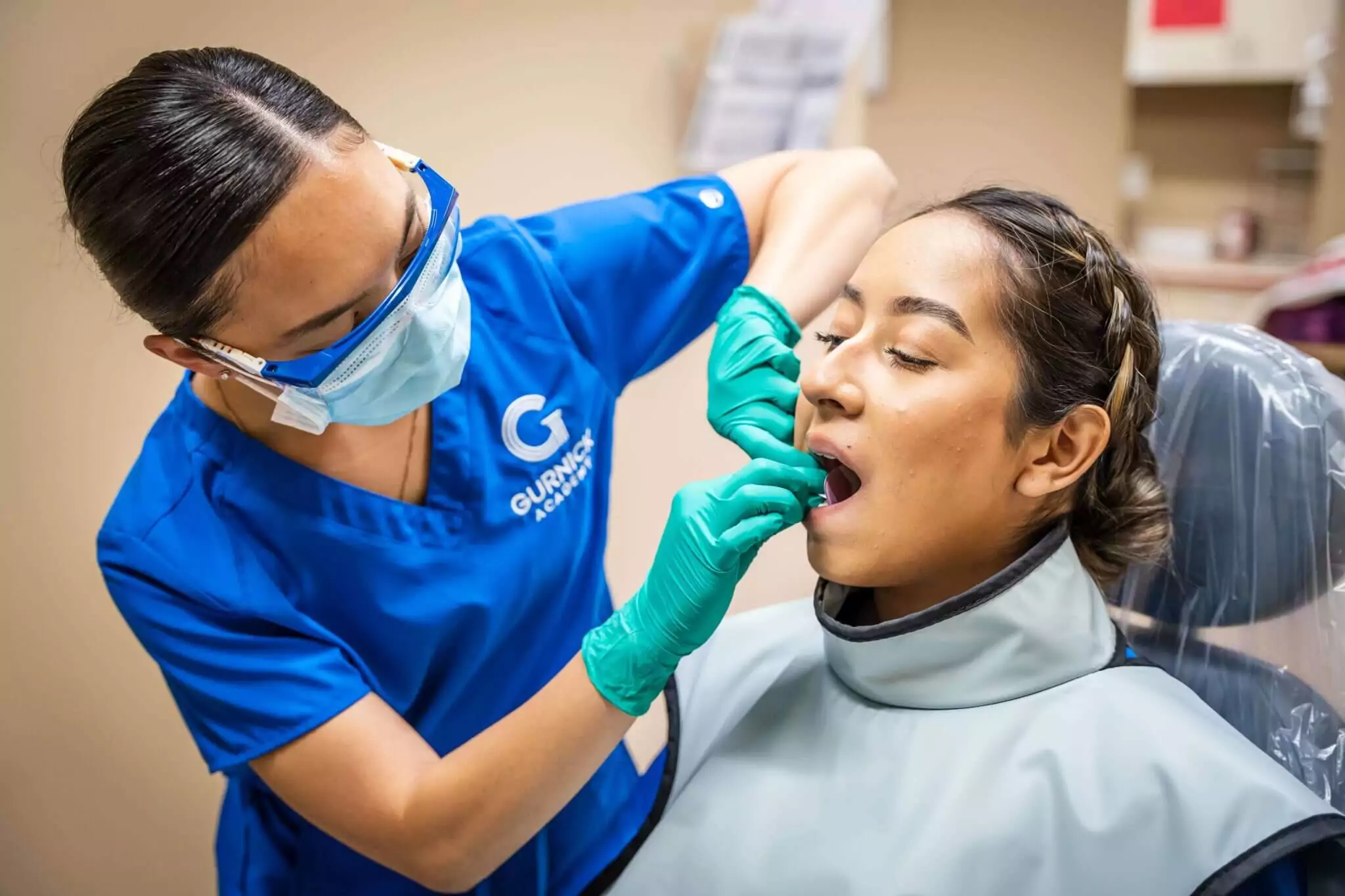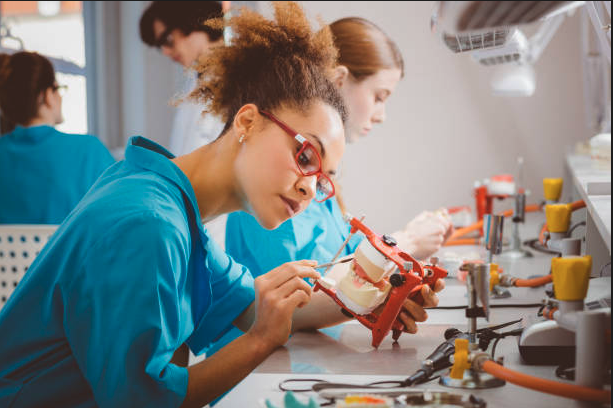Table of contents
Get Started with Kwikly
Get the latest updates, insights, and exclusive content delivered straight to your inbox.
Starting Pay - Here's What's Real
Your starting pay as a dental assistant depends a lot on where you live. Generally, you’re looking at $20 to $30 per hour when you’re just starting out, which translates to somewhere between $35,470 and $61,060 annually. That’s a pretty wide range, and location is a big reason why.
Different states pay different amounts - it’s just how it works. Salaries can also vary significantly by state and metro area, as regional differences in demand and workforce shortages impact compensation. We’ll look at what you can expect on average and how different states stack up so you can get a realistic picture of what’s out there.
These numbers matter when you’re making career choices and negotiating your first paycheck. Let’s dig into the specifics so you know what to expect.

What Most People Actually Make
The median annual salary for dental assistants sits at $47,300, which makes it a decent entry-level job in healthcare. Here's what the pay looks like:
- Most dental assistants earn between $20 to $30 per hour or more.
- The top earners make over $61,780 a year.
- This median salary beats a lot of other healthcare support roles - pharmacy techs, for example, make around $39,000 annually.
When you compare dental assistant pay to other healthcare jobs, you're actually in pretty good shape. The median for other healthcare support staff is $38,220, which is noticeably lower. That tells you there's real demand for skilled dental assistants.
How Different States Stack Up
Pay varies a lot from state to state because some places need more dental assistants than others. States like California and Virginia pay more than places like Oklahoma and Indiana - it’s all about supply and demand.
In big metro areas like Seattle-Tacoma-Bellevue, you’ll probably earn more because there’s more demand for dental services. Where you choose to work can really impact how much you make.
Knowing these differences helps you make smart choices about where to start your career. High-demand regions often need to fill more dental assistant positions, which can drive up starting pay.
What Actually Affects Your Starting Pay
Your starting pay depends on several things, and location is probably the biggest one. Different states pay different amounts because they need different numbers of dental assistants and have different costs of living.
Your education level matters too. If you get an associate degree or specialty certifications, you’ll usually make more money. The type of dental office you work in can also affect your pay—specialized practices generally pay better. The specific duties you perform, such as clinical or administrative tasks, can also influence your starting pay.
Certifications make a real difference. Completing formal education or certification programs is important to maximize your earning potential. Certified Dental Assistants typically earn about 15% more per hour than those without certification. Getting certified through organizations like DANB is worth it if you want to boost your earning potential.
Where You Work Matters
Where you work as a dental assistant can make a big difference in how much you earn. In general, cities tend to pay more than rural areas. Part of this is because the cost of living is higher in urban areas, but it’s also tied to greater demand for dental services in those regions. For example, in the Seattle-Tacoma-Bellevue area, wages are higher because dental offices need more staff to keep up with demand. Even within the same state, different metropolitan areas can offer very different pay, making location an important factor in your career.

Education Pays Off
Getting more education and certifications can really bump up your starting salary. If you pursue an associate degree, you’ll often see better pay opportunities. Classroom-based learning is especially valuable for dental assistants, as it provides hands-on experience and helps in earning certifications that are essential for career advancement.
Dental assistants with advanced degrees usually make more money and have more job options. Investing in your education pays off in higher starting pay and better career prospects.
Certifications Are Worth It
Certified Dental Assistants generally make about 15% more per hour than those without certification. That’s real money we’re talking about.
If you get multiple certifications, you can boost your hourly wage even more. DANB certification especially helps - people with it earn more than the national median compared to those without it. Certifications from reputable organizations such as Columbia are also highly regarded and are recognized by various government departments, including the Department of Veterans Affairs, which can enhance your career mobility and validation. Continuing education opens up specialized roles that pay even better, highlighting the importance of credentials within the field of dentistry.
Work Environment: What to Expect on the Job
Dental assistants work in a variety of settings, from private dental offices to clinics and even hospitals. The work environment is often fast-paced and focused on delivering excellent patient care. Most dental assistants work full-time, but it’s common for dental assistants to work evenings or weekends to accommodate patients’ busy schedules. This flexibility is a big part of the job, especially in larger practices or cities where patient demand is high.
Dental assistants are always on the move: prepping exam rooms, assisting with procedures, and making sure everything runs smoothly. The work environment is dynamic, and you’ll need to be ready to handle a range of tasks each day. For most dental assistants, the variety and pace keep things interesting and rewarding.
Typical Dental Office Settings
When dental assistants work in a typical dental office, they’re surrounded by a mix of spaces: a welcoming reception area, exam rooms where most of the action happens, and a lab area for preparing dental materials. Dental assistants work closely with dentists, dental hygienists, and other staff, making teamwork essential.
Offices are usually equipped with modern dental equipment—think digital x-ray machines, electronic patient records, and specialized tools for different procedures. Dental assistants play a key role in keeping this equipment organized and ready for use, ensuring the office runs efficiently and patients get the best care possible.
Team Dynamics and Daily Routines
Dental assistants are a vital part of the dental team, working side-by-side with dentists and dental hygienists to care for patients. Daily routines can include everything from preparing patients for exams and taking x-rays to assisting during procedures and handling patient records. Communication is a big part of the job; dental assistants often act as a bridge between patients and the rest of the dental team.
In busy metro areas like Seattle-Tacoma-Bellevue or York-Newark-Jersey City, dental assistants may work in high-volume offices where teamwork and efficiency are especially important. Whether you’re in a big city like Newark, Jersey, or a smaller community, being adaptable and a good communicator will help you thrive in any dental office setting.
How Dental Assistant Pay Compares to Other Healthcare Jobs
Dental assistants actually do pretty well compared to other healthcare roles. Certified dental assistants earn about 15% more than non-certified ones, which shows how much certifications matter. The type of practice you work in also makes a difference - specialized practices usually pay more.
When you look at dental assistant salaries next to other healthcare jobs, dental assistants often come out ahead. You'll typically earn more starting out than medical assistants, pharmacy technicians, and phlebotomists. That's a real advantage if you're choosing between healthcare careers.
Dental Assistants vs. Medical Assistants
Dental assistants generally make more than medical assistants, with the top earners making over $61,780 annually. Both jobs are important in healthcare, but they have different responsibilities and pay scales. Dental assistants, because of their specialized skills, usually command higher salaries.
The difference in pay and responsibilities between these roles shows why specializing in dental work can be financially smart. It makes dental assisting an attractive career choice.
Dental Assistants vs. Pharmacy Technicians
Pharmacy technicians typically start with lower salaries compared to dental assistants. This reflects the specialized skills and responsibilities that come with being a dental assistant.
This comparison shows the financial benefits of choosing dental assisting over pharmacy technology, making it a more lucrative option if you're entering healthcare.
Dental Assistants vs. Phlebotomists
Dental assistants generally earn higher starting salaries than phlebotomists because of the specialized nature of their work. This highlights the differences in job responsibilities and skill sets between the two roles.
While both dental assistants and phlebotomists can expect job growth, the rates might differ. The financial advantage of being a dental assistant makes it a more attractive career option if you're looking for higher starting pay.

How to Boost Your Starting Pay
There are several ways to increase your starting pay as a dental assistant:
- Get certifications like the Certified Dental Assistant (CDA) credential, which can potentially increase your earnings by $2 more per hour and open up career advancement opportunities.
- Pursue additional education.
- Gain experience through temporary work.
You can also request a raise by demonstrating your value to your employer and taking on additional responsibilities.
Specialty certifications in areas like infection control make you more marketable and can lead to higher pay. Platforms like Kwikly also offer dental assistants opportunities to find better-paying temporary positions.
These strategies help you maximize your earning potential and advance your career, giving you the skills and confidence you need to succeed. As you gain experience and certifications, you may also have the opportunity to train new staff, further increasing your value and earning potential.
Getting More Education
More education directly affects your starting pay as a dental assistant. Different levels of formal education, like certificates and degrees, influence what you'll make starting out. Specialty certifications from organizations like DANB can boost your earning potential and job prospects even more.
Investing in education and training can significantly increase your starting pay and advance your career. Additional education opens up more job opportunities and leads to higher salaries.
Getting Specialty Certifications
Specialty certifications in areas like orthodontics or oral surgery are valuable credentials. Getting these certifications can lead to significantly higher salaries and better earning potential.
Dental assistants with specialty certifications often see a pay increase of 15% or more, which reflects the higher demand for specialized skills. Pursuing specialty certifications is a smart way to boost your career prospects and salary potential.
Getting Experience Through Temp Work
Temporary work gives you valuable experience and lets you explore different work environments. Getting experience through temp positions helps you build skills and improve your resume, making you a more attractive candidate for permanent roles. You can search for temporary dental assistant jobs using online platforms and staffing agencies to find opportunities that match your needs.
Kwikly gives dental professionals control over their schedules, making it easier to manage work-life balance. You can earn competitive pay rates and get same-day payouts, which provides financial stability.
Salary Negotiation Tips for Dental Assistants
When it comes to salary, dental assistants have more room to negotiate than you might think. Certified dental assistants, in particular, can often command higher salaries thanks to their advanced training and skills. If you’re looking to boost your pay, it’s important to consider all the factors that can influence your salary—like location, experience, certification, and the local cost of living.
Before you start negotiating, check out the average salary range for dental assistants in your area. Remember, salaries can vary widely depending on where you live, so factor in the cost of living and what other dental assistants are earning nearby. Don’t forget to highlight your training, certifications, and any specialized skills you bring to the table—these can all help you make a strong case for higher pay.
How to Prepare for Negotiations
Preparation is key when negotiating your salary as a dental assistant. Start by researching the average salary for dental assistants in your city or state, taking into account factors like experience, education, and certification. If you’re in states like California, Oklahoma, Utah, or Indiana, be sure to consider the local cost of living and how it might affect your take-home pay.
Be ready to talk about your education, training, and any certifications you’ve earned—these are valuable assets that can set you apart. Highlight any extra responsibilities you’re willing to take on, and don’t be shy about discussing your skills and the value you bring to the dental team. Programs that offer bonuses, paid training, or continuing education can also be great ways to boost your career and salary.
Confidence is crucial—go into negotiations knowing your worth and be prepared to advocate for yourself. By doing your homework and presenting your qualifications clearly, you’ll be in a strong position to negotiate a salary that reflects your skills and contributions as a dental assistant.
Job Outlook - It's Looking Good
The employment outlook for dental assistants is solid. Here’s what you can expect:
- Growth rate of 8% from 2023 to 2033, which is higher than the average growth rate for all occupations.
- Growth driven by increasing demand for dental services, largely because the population is aging.
- Job growth above the average for all sectors.
This makes dental assisting a promising career choice, but it's important to be aware of common dental tax questions for U.S. professionals and practices.
The growing number of older adults is driving increased demand for dental care and, consequently, dental assistants. Let’s look at projected job growth and demand in major metro areas.
Job Growth Projections
Job growth for dental assistants looks significant over the next decade, with positions expected to grow at an average rate of 7% through 2032. The increasing demand for dental services, largely driven by the aging population, is a key factor in this projected growth.
This strong job outlook provides plenty of opportunities for people entering the field and looking to advance their careers.

Demand in Big Cities
Major urban centers are seeing a surge in demand for dental assistants because of several factors:
- Larger populations in urban centers
- Aging baby boomers needing more dental procedures and preventive care
- About 54,900 job openings anticipated annually over the next decade
- Demand driven mainly by workforce turnover and retirements
Big metro areas like New York-Newark-Jersey City and Seattle-Tacoma-Bellevue show high demand for dental assistants, often leading to higher wages. Understanding where the demand is highest can help you strategically plan your career.
How Kwikly Can Help Boost Your Career
Kwikly is a leading dental staffing platform in the United States that helps dental assistants find better-paying job opportunities. We connect dental professionals with reputable employers and provide access to high-quality job placements. Using these connections can significantly increase your earning potential.
Kwikly gives you total control over scheduling, letting you pick up shifts that fit your availability. With competitive pay and same-day payout options, Kwikly ensures financial stability and career growth.
Let's look at how Kwikly provides flexibility, competitive pay, and access to quality employers.
Flexibility and Control
The Kwikly app lets you select your own work hours and shifts, giving you greater career autonomy. This flexibility lets you maintain a healthy work-life balance while maximizing your earning potential, including on weekends and evenings.
Kwikly lets you have total control over your work schedule, so you can select workdays and hours that align with your personal commitments. This control is a significant advantage for dental assistants managing their careers effectively.
Competitive Pay and Same-Day Payouts
Kwikly guarantees competitive wages for dental assistants and offers same-day payments through the Kwikly Wallet system. This immediate access to your earnings is a game-changer if you're seeking financial stability, making Kwikly an attractive platform.
You can earn competitive pay rates and get same-day payouts using Kwikly. This financial flexibility ensures you can manage your finances effectively while working shifts that fit your schedule.
Access to Quality Employers
Kwikly connects you with reputable employers, ensuring you work in trusted environments like Heartland Dental and Smile Brands. Access to high-quality employers is a significant advantage if you're seeking stable and rewarding job opportunities.
Through Kwikly, you gain access to reputable employers, ensuring quality job placements in the dental field. This network helps you build a successful and fulfilling career.
Bottom Line
Your starting pay as a dental assistant varies widely based on where you work, your education level, and what certifications you have. The median annual salary for dental assistants is competitive, especially compared to other healthcare support roles. By understanding these factors and taking steps to enhance your qualifications, you can significantly boost your earning potential.
Platforms like Kwikly offer additional opportunities to maximize your career through flexible scheduling, competitive pay, and access to high-quality employers. With the right strategies and tools, you can navigate your career path successfully and achieve your financial goals. Start your journey today and take control of your career as a dental assistant!
Common Questions About Dental Assistant Pay
What's the median starting salary for dental assistants in the United States?
The median annual salary for dental assistants in the United States is $47,300, which translates to an hourly wage range of about $20 to $30.
How do location and state affect dental assistant salaries?
Location and state play a huge role in determining dental assistant salaries. Urban regions typically offer higher wages, with states like California and Virginia providing some of the highest salaries in the field. You should definitely consider these factors when evaluating potential job opportunities.
How can dental assistants increase their starting pay?
You can increase your starting pay by pursuing higher education, getting specialty certifications, and gaining experience through temporary positions. These steps enhance your skills and make you more marketable in the field.
How does Kwikly help dental assistants boost their careers?
Kwikly empowers dental assistants by providing flexible scheduling, competitive pay, and immediate payouts, enabling you to enhance your earning potential and advance your career effectively.
What's the job outlook for dental assistants over the next decade?
The job outlook for dental assistants is solid, with employment projected to grow by 8% from 2023 to 2033 due to rising demand for dental services and an aging population. This indicates a stable and expanding career opportunity in the field.








